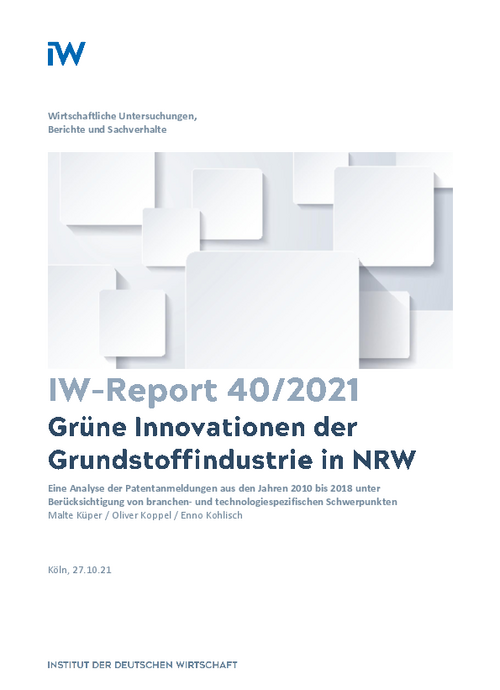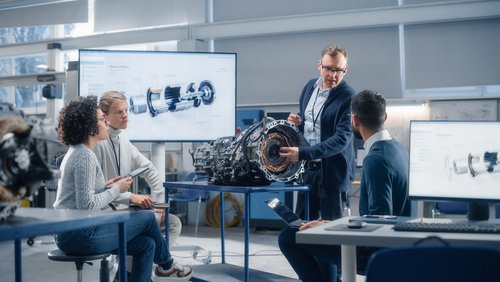Transforming the economy towards climate-neutrality poses major challenges for the energy-intensive primary industry in North Rhine-Westphalia (NRW). At the same time, the development of environmentally friendly basic materials and production processes presents a great potential for transforming NRW into an attractive industrial location for the future.

Green innovations in the basic materials industry in NRW

Transforming the economy towards climate-neutrality poses major challenges for the energy-intensive primary industry in North Rhine-Westphalia (NRW). At the same time, the development of environmentally friendly basic materials and production processes presents a great potential for transforming NRW into an attractive industrial location for the future.
In order to get there, the creativity and innovative ability of the region's companies will be more important than ever. To scientifically assess this technological transformation, an analysis of patent activities using the IW patent database was carried out in this study.
The main focus was on the identification of climate-relevant innovations of NRW companies in the energy-intensive industries, as well as in the energy and gas supply, in the period from 2010 to 2018. As per definition, patents already aim at a further development of the status quo. Therefore, in order to avoid a certain indeterminacy, a definition of climate-relevant patent applications in a narrower sense was developed in this study, for which the positive climate-effect must represent the core and not a mere concomitant of the innovation to be patented.
Overall, around 8,200 patent applications (both climate-relevant and non-climate-relevant) from 220 companies were identified during the considered period, with 16.4 percent meeting the criterion "climate-relevant in the narrower sense" and thus qualifying as green innovations. Over the period considered, a slight increase in the total number of patent applications can be observed. Climate-relevant patent applications followed this positive trend until 2017, before jumping by almost 37 percent in the following year. Remarkably, while a decline in non-climate-relevant patent applications can be observed after the global economic crisis of 2008/2009, green patent applications actually increased. Possible reductions in the R&D budgets of some companies in the aftermath of the crisis were thus evidently not at the expense of climate-relevant innovations.
Within the scope of the analysis of climate-relevant patent applications, this study also examined technological development trends of the companies. Therefore, the identified green patents were assigned to six technology fields by means of a keyword search. The results confirm the high importance of climate-friendly innovations in the field of renewable energies, which accounts for 29 percent of all climate-relevant patents. Almost one fifth of the applications respectively belongs to the technology fields efficiency/heat and environment. Innovations in the field of hydrogen and circular economy account for just over 10 percent of green patent applications. Innovations in e-mobility have a share of 6 percent of the climate protection patents.

Green innovations in the basic materials industry in NRW

More on the topic

The Transformation of the Automotive Industry: An International Comparison of Germany's Innovation Performance
The automotive industry is undergoing a comprehensive technological transformation that is challenging established value chains. Making sure that domestic research helps to shape this ongoing transformation is therefore an important task for countries with a ...
IW
Innovation Atlas 2023: The innovative strength of the German regions
All indicators of innovative strength in Germany – from research intensity and scientific and technical employment structures to patent successes – point to a strong south-north, west-east and urban-rural divide.
IW